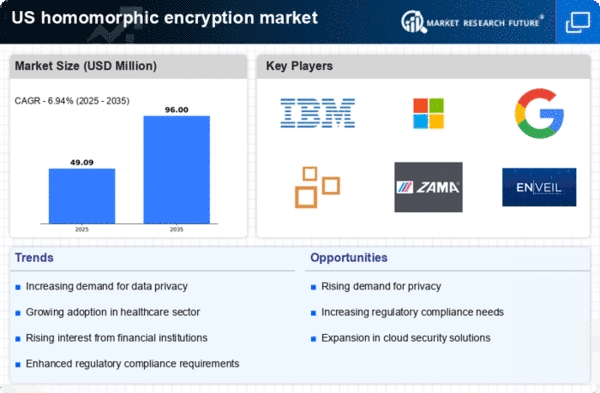Rising Cybersecurity Threats
The escalating cybersecurity threats in the US are propelling the homomorphic encryption market forward. With data breaches and cyberattacks becoming more sophisticated, organizations are seeking advanced encryption methods to protect sensitive information. Homomorphic encryption offers a unique advantage by enabling computations on encrypted data, thus minimizing exposure to potential threats. The market is projected to grow at a CAGR of 30%, reaching an estimated $1.8 billion by 2027. This growth trajectory underscores the urgency for businesses to adopt robust encryption solutions to mitigate risks associated with data security breaches.
Demand for Secure Data Sharing
The homomorphic encryption market is witnessing a surge in demand for secure data sharing solutions. As organizations increasingly collaborate and share sensitive information, the need for secure methods to facilitate this exchange becomes critical. Homomorphic encryption allows data to be shared and processed without revealing the underlying information, thus maintaining confidentiality. This capability is particularly valuable in sectors such as finance, healthcare, and research, where data privacy is paramount. The market is anticipated to reach $1.4 billion by 2026, reflecting a growing recognition of the importance of secure data sharing practices in an interconnected world.
Growing Adoption of Cloud Computing
The homomorphic encryption market is significantly influenced by the growing adoption of cloud computing services across various sectors in the US. As organizations migrate to cloud environments, the need for secure data processing becomes paramount. Homomorphic encryption allows data to be processed in an encrypted state, thus ensuring confidentiality even in cloud infrastructures. This capability is particularly appealing to industries such as finance and healthcare, where data sensitivity is critical. The market is expected to witness a surge, with estimates suggesting a valuation of $1.2 billion by 2025. This growth is indicative of the increasing reliance on cloud solutions and the corresponding need for secure data handling mechanisms.
Increasing Regulatory Compliance Requirements
The homomorphic encryption market is experiencing growth driven by the increasing regulatory compliance requirements in the US. Organizations are compelled to adhere to stringent data protection regulations such as the Health Insurance Portability and Accountability Act (HIPAA) and the General Data Protection Regulation (GDPR). These regulations necessitate robust encryption methods to safeguard sensitive information. As a result, businesses are increasingly adopting homomorphic encryption solutions to ensure compliance while maintaining data utility. The market is projected to reach approximately $1.5 billion by 2026, reflecting a compound annual growth rate (CAGR) of around 25%. This trend indicates a strong demand for advanced encryption technologies that can meet regulatory standards without compromising data accessibility.
Technological Advancements in Encryption Techniques
The homomorphic encryption market is being driven by technological advancements in encryption techniques. Innovations in algorithms and computational methods are enhancing the efficiency and practicality of homomorphic encryption, making it more accessible to organizations. These advancements are crucial as they address previous limitations related to performance and scalability. As a result, businesses are increasingly integrating homomorphic encryption into their data protection strategies. The market is projected to grow significantly, with estimates indicating a value of $1.6 billion by 2026. This growth highlights the potential of emerging technologies to transform the landscape of data security.

















